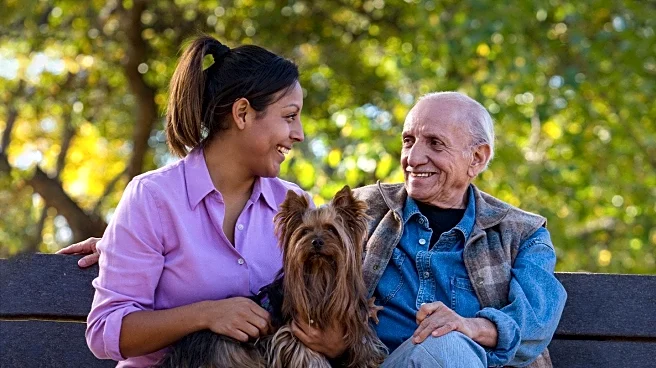What's Happening?
Jewish education is increasingly incorporating intergenerational wisdom by actively involving grandparents in the learning process. This approach emphasizes storytelling, cultural traditions, and personal
histories as vital components of Jewish identity formation. Grandparents, often sidelined in formal education settings, are now being recognized as essential contributors to the educational experience. Initiatives such as storytelling sessions, intergenerational pairings, and cultural activities like baking challah are being integrated into curricula to foster deeper connections across generations. These efforts aim to create a more holistic and personal educational experience, where the lived experiences and memories of elders enrich the learning environment.
Why It's Important?
The inclusion of grandparents in Jewish education is significant as it addresses the need for a more comprehensive approach to identity formation. By leveraging the wisdom and experiences of older generations, educational programs can offer students a richer understanding of their cultural heritage. This method not only preserves traditions but also strengthens community bonds by ensuring that the stories and values of the past are passed down to future generations. In a digital age where attention spans are short, the slow and heartfelt wisdom of grandparents provides a counterbalance, offering students empathy and historical context that textbooks alone cannot provide. This approach is crucial for maintaining cultural continuity and fostering a sense of belonging among young Jews.
What's Next?
As Jewish educational institutions continue to embrace intergenerational learning, they may develop more structured frameworks to integrate grandparents into their programs. This could involve formal partnerships with senior homes, creating dedicated roles for grandparents in educational settings, and expanding curriculum elements that focus on personal storytelling and cultural traditions. The success of these initiatives could inspire other cultural and religious communities to adopt similar approaches, recognizing the value of intergenerational wisdom in education. Additionally, there may be increased advocacy for policies that support family involvement in educational processes, further enriching the learning experiences of students.
Beyond the Headlines
The movement towards intergenerational learning in Jewish education highlights broader cultural shifts towards valuing elder contributions in society. It challenges the notion that education is solely the domain of professionals, instead recognizing the family as a foundational educational unit. This approach may also influence how other educational systems view the role of elders, potentially leading to a reevaluation of how cultural and historical knowledge is transmitted across generations. Furthermore, it underscores the importance of community engagement in education, suggesting that learning is not just an individual pursuit but a collective endeavor that benefits from diverse voices and experiences.









